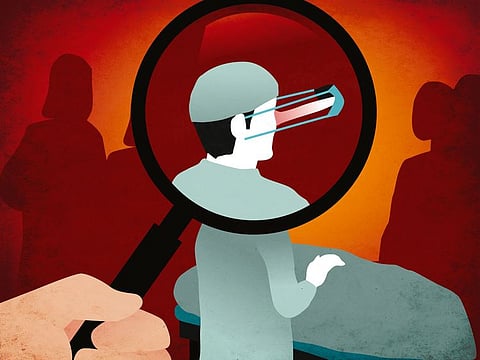Why background checks of doctors are important
Awareness of malpractice suits will help people decide on their choice of a physician

Two recent tragic episodes have thrown the spotlight on medical practice. The death of a 42-year-old woman during a hip replacement surgery and the case of a 22-year-woman who slipped into a coma following a routine cosmetic surgery have shaken up the community in the UAE.
The cases are under investigation, and we are not yet aware of what went wrong during the procedures. So it is too early to pin the blame on anybody.
The UAE laws are stringent when it comes to tackling malpractice in health care. The Dubai Health Authority now requires all day-care surgical centres to be accredited. So every centre has to obtain accreditation from one of the international agencies. And that ensures that the processes and practices followed by the centres are in line with the international best practices.
People make mistakes. So do doctors. But when doctors err, lives are at risk. So the public has a right to know about any malpractice suits against medical practitioners. It will help patients decide if they want to trust a particular physician with their lives.
Second opinions are important. Physicians should not be unduly perturbed if a patient wants to seek an opinion from another doctor, even if it is from the same hospital.Jumana Al Tamimi
Doctors in the UAE, like most other countries, are insured against medical malpractice claims. Repeated claims could lead to higher insurance premiums and could make the physician a burden rather than an asset for the hospital.
Medical malpractice exists all over the world. In the US, it is the third leading cause of death behind heart disease and cancer, according to a study by Johns Hopkins Hospital. In neighbouring Canada, the claims are less compared to the US, due to several factors, including the low compensations. In Japan, there is an increasing number of claims, amid growing public awareness and concerns.
In the Arab region, comprehensive figures on malpractice and medical negligence cases are not available. Most cases are dealt with discreetly, and some are not reported for various reasons. One law firm in the region says in an online post that there has been a notable increase in compensation cases awarded to the claimants in recent years.
In 2012 an Abu Dhabi court ruled for the payment of Dh3 million to a family of a woman who was left in a “permanent vegetative state” following treatment. Another court in Abu Dhabi awarded Dh7 million to the family of a 12-year-old boy who suffered brain damage following an overdose of anaesthesia.
Over the past two decades, the health care services in Saudi Arabia have significantly evolved, but medical negligence claims have also increased, more due to awareness. Bahrain efforts to raise the health care standards resulted in “stringent action” against 53 medical practitioners by the National Health Regulatory Authority.
Egypt, the most populous Arab country, looked at malpractice litigation over four years and found that the majority of the cases occurred in general hospitals. In Lebanon, a 2014 report by the Lebanese Transparency Association, said, “Most cases of medical errors remain well-kept secrets as physicians fear humiliation and potential job loss.”
Also Read: What’s the poison on your plate?
Also Read: Perils of misusing social media
Also Read: #MeToo offers lessons for Arabs too
Countries in the Middle East can learn from the experiences of others. In the region, doctors don’t own their clinics or hospitals; they are employees. Since most medical facilities belong to investors, physicians often have to maintain a high standard.
Do doctors call for needless procedures to enhance revenue for hospitals? Do they prescribe medicines that are not required at all? Some people think so. They feel that hospitals put pressure on doctors to use all avenues to meet their targets. If insurance companies foot the bill, patients are not directly affected: at least not financially. But unnecessary medicines and procedures are harmful in the long run.
Doctors all over the world come under intense scrutiny. One colleague, while waiting for his turn to see the doctor, timed the appointments. Each of them lasted a mere 12 minutes. This is not a scientific study, and this may not be true of every doctor. But 12 minutes! That’s shocking. A poor diagnosis could end in complications or even a loss of life.
That’s why second opinions are important. Physicians should not be unduly perturbed if a patient wants to seek an opinion from another doctor, even if it is from the same hospital. It should not be seen as a lack of confidence in their ability. The patient is making absolutely sure that there is no other recourse. And every patient has the right to ask questions so that his or her fears are addressed or assuaged. After all, life is precious.
Sign up for the Daily Briefing
Get the latest news and updates straight to your inbox



